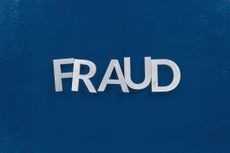States With the Highest Powerball Taxes
If you end up with the winning Powerball numbers, these states will take the biggest tax bite out of your payout.


Powerball numbers are on many people's minds since the jackpot soared again (it stood at $1.326 billion for the April 6 winning ticket) following another recent Powerball lottery jackpot prize of $1.76 billion. Powerball excitement includes the prospect of winning big — and, unfortunately, paying some taxes on that prize.
Although some states won’t tax your Powerball winnings, many states will, and some have higher tax rates than others.
Powerball after taxes: Highest lottery tax states
Here are the states with the highest lottery tax rates. (It is important to note that you will also pay federal taxes on your Powerball prize. Generally, 24% comes off the top for federal income tax. You will likely pay additional tax on your income when you file your return at a rate that depends on your income tax bracket.)

Sign up for Kiplinger’s Free E-Newsletters
Profit and prosper with the best of expert advice on investing, taxes, retirement, personal finance and more - straight to your e-mail.
Profit and prosper with the best of expert advice - straight to your e-mail.
Related: Powerball Jackpot Winner Will Get a Hefty Tax Bill
New York
New York state tax rate on lottery winnings: 10.90%
According to New York state law, If the proceeds from your lottery win are $5,000 or less, the prize payment isn’t considered New York source income. So smaller prize money amounts won’t be subject to New York income tax. (In New York, “proceeds” are the total amount of the prize minus the cost of the winning ticket.)
Note: A Powerball ticket costs $2 per play.
Maryland

Maryland tax rate on lottery winnings: 8.75%
Maryland will deduct 8.95% of state tax if you’re a resident and your prize exceeds $5,000. If you’re a non-resident, the state tax withholding rate on your lottery winnings will be 8%.
Remember, the state tax is in addition to the 24% initial withholding for federal taxes. Also, you are required to report your lottery winnings on your tax return since the Maryland lottery says prizes from $601 to $5,000 may be taxable.
Washington, DC

Washington, DC tax rate on lottery winnings: 8.5%
Washington, DC, isn't a state. However, according to the District of Columbia’s Office of Lottery and Gaming, winnings over $5,000 are subject to an 8.5% tax rate for District income tax.
However, under Washington DC regulations, all lottery winnings that exceed $600 are reported to the District Office of Tax and Revenue.
Honorable Mentions: Oregon and New Jersey
Oregon tax rate on lottery winnings: 8%
Oregon withholds an 8% state tax on lottery prizes of $1,500 or more. So, your lottery prize payout comes minus the 8% state tax. The state reminds taxpayers that any large lottery prize is considered taxable income.
However, the Oregon Lottery provides guidance on its website regarding lump sum vs. annuity payouts and taxes. “An annuity option pays out a larger amount of dollars over 30 years, but each annuity payment would be subject to tax. A one-time lump sum cash payment pays out less overall but, as it comes in a single payment, gets taxed at payout.”
New Jersey tax rate on lottery winnings: Up to 8%
According to the state’s lottery, New Jersey taxes lottery prizes of more than $10,000 and up to $500,000 at a rate of 5%. But since we’re talking about a massive Powerball jackpot, the state’s higher 8% withholding tax rate applies to a lottery prize greater than $500,000.
Winners receive a Form W2-G at the end of the year. That form shows the amount of lottery prize winnings that should be reported as income and the amount of federal and state taxes withheld.
Powerball numbers
To win the Powerball jackpot, you must match six numbers from the Powerball drawing. The drawing takes place every Monday, Wednesday, and Saturday at 10:59 p.m. ET.
You can find the winning numbers from the last drawing on Powerball's website. If no one matches all six numbers, the Powerball rolls, and the jackpot amount increases.
Related Content

As the senior tax editor at Kiplinger.com, Kelley R. Taylor simplifies federal and state tax information, news, and developments to help empower readers. Kelley has over two decades of experience advising on and covering education, law, finance, and tax as a corporate attorney and business journalist.
-
 Is 100 the New 70?
Is 100 the New 70?Eating well, exercising, getting plenty of sleep and managing chronic stress can help make you a SuperAger. Funding that long life requires longevity literacy.
By Phil Wright, Certified Fund Specialist Published
-
 Nine Lessons to Be Learned From the Hilton Family Trust Contest
Nine Lessons to Be Learned From the Hilton Family Trust ContestDisclaimers, good communication, post-marital agreements and more could help avoid conflict in a family after the owners of a wealthy estate pass away.
By John M. Goralka Published
-
 'Instant' EV Tax Credits Are a Hit: $580M Paid This Year
'Instant' EV Tax Credits Are a Hit: $580M Paid This YearEV Credits Claiming federal electric vehicle tax credits at the point of sale is a new and popular option in 2024.
By Kelley R. Taylor Last updated
-
 Retirees Face Significant Tax Bills Due to Fraud
Retirees Face Significant Tax Bills Due to FraudFraud A new report sheds light on how older adult scam victims end up with big tax bills and lost retirement savings.
By Kelley R. Taylor Last updated
-
 Tax Day: Is the Post Office Open Late?
Tax Day: Is the Post Office Open Late?Tax Filing Tax Day means some people need to mail their federal income tax returns.
By Kelley R. Taylor Published
-
 High Earners: Beware of These Illegal Schemes to Lower Taxes
High Earners: Beware of These Illegal Schemes to Lower TaxesTax Schemes The IRS says high-income filers are targets for several illegal tax schemes.
By Katelyn Washington Last updated
-
 Mailing Your Tax Return This Year? What to Know Before You Do
Mailing Your Tax Return This Year? What to Know Before You DoTax Filing There are plenty of reasons not to mail your tax return this year, but here’s what you should know if you are.
By Katelyn Washington Last updated
-
 IRS Warning: Beware of Smishing and 'Helper' Tax Scams
IRS Warning: Beware of Smishing and 'Helper' Tax ScamsScams Tax season is a time to look out for email and text message scams.
By Kelley R. Taylor Last updated
-
 Most Expensive States to Live in for Homeowners
Most Expensive States to Live in for HomeownersProperty Taxes High property tax bills make the places on this list the most expensive states for homeowners to live in.
By Katelyn Washington Last updated
-
 Don’t Miss This $2,500 Tax Break for Paying Your Student Loan
Don’t Miss This $2,500 Tax Break for Paying Your Student LoanTax Deductions Do you qualify for the student loan interest deduction this year?
By Katelyn Washington Last updated
